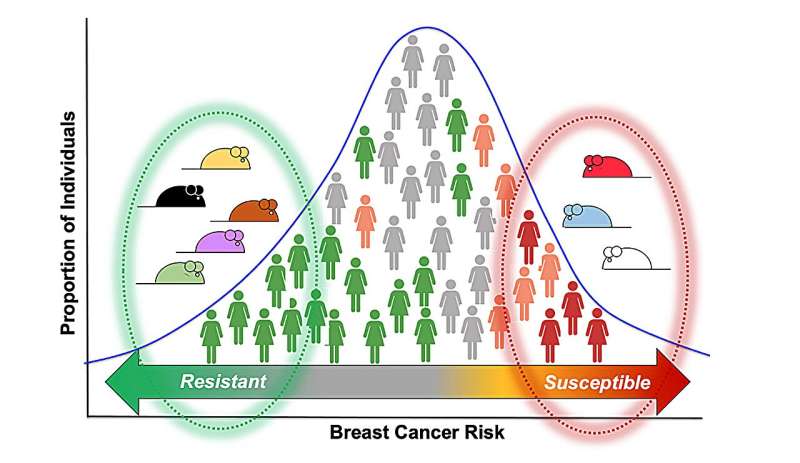Loss of p53 predisposes to mammary tumors in mice and in women, but penetrance varies among individuals. Credit: Oncotarget (2023). DOI: 10.18632/oncotarget.28387
A new editorial perspective titled "Genetic modifiers of p53: opportunities for breast cancer therapies" has been published in Oncotarget.
Each day our cells encounter a wide range of genomic damage and the p53 protein arbitrates decisions of cell cycle arrest to allow repair of DNA or promote elimination of cells with malignant potential through apoptosis. In this new editorial perspective, researchers Prabin Dhangada Majhi, Aman Sharma and D. Joseph Jerry from the University of Massachusetts, Pioneer Valley Life Sciences Institute and Rays of Hope Center for Breast Cancer Research discuss TP53 mutations.
The prevalence of TP53 mutations in nearly all tumors emphasizes its role as a formidable barrier that must be breached to allow oncogenic transformation. Inherited mutations in TP53 are also the primary genetic lesions found in Li-Fraumeni Syndrome (LFS), a familial cancer predisposition characterized by tumors in many tissues. However, tissues are not all equally vulnerable to disruptions in p53 function.
Among women with inherited mutations in TP53, breast cancer is by far the most common tumor. Somatic mutations in TP53 are also prevalent in sporadic breast cancers, especially in the triple-negative subtype. The proportion rises to nearly 50% of breast cancers that exhibit impaired function of the p53 pathway based on gene expression signatures as a surrogate biomarker of p53 activity. Therefore, the breast epithelium appears to be uniquely sensitive to alterations in p53 function.
"Genome-wide association studies (GWAS) have identified over 300 polymorphisms that contribute to breast cancer risk. These provide a rich resource of candidate polymorphisms that may modify the consequences of mutations in TP53," the researchers write.
More information: Prabin Dhangada Majhi et al, Genetic modifiers of p53: opportunities for breast cancer therapies, Oncotarget (2023). DOI: 10.18632/oncotarget.28387
Journal information: Oncotarget
Provided by Impact Journals LLC






















